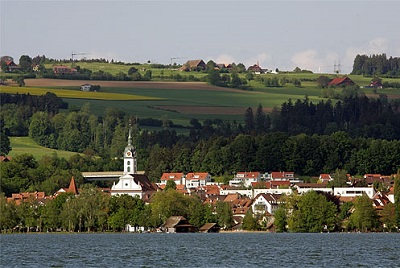This great victory gained by the Swiss not only widened and established more firmly the career of military glory commenced at Morgarten, but it gave to the Confederation independence, and far greater military and political eminence.
Continuing The Swiss Win Independence,
our selection concluding Baker and then from The Story of Switzerland by Lina Hug and Richard Stead published in 1890. The selection is presented in 1.5 installments, each one 5 minutes long.
Previously in The Swiss Win Independence.
Time: 1389
Place: Sempach, Switzerland

CC BY-SA 3.0 image from Wikipedia.
Though Bern took no part in the battle of Sempach, after that victory she entered actively into the war, and overran the Austrian dependencies in Freiburg and Valengrin. She drove the Duke’s followers out of Rapperschwyl, annexed Nidau and Bueren, and conquered the upper Simmenthal.
At length, both sides being weary of war and carnage, a peace was signed for seven years in 1389, with the condition that Bern should restore Nidau and Bueren. This peace was in 1394 further prolonged for twenty years. These treaties brought great benefits to Switzerland in many ways. Glarus and Zug obtained their formal freedom from Austrian rule in payment of a moderate sum of money; Schwyz received the town and abbey of Einsiedeln (1397); Lucerne purchased Sempach and Entlibuch from the Duke, as also other towns; but chief of all, the political power of the Hapsburgs came to an end in Switzerland.
An important feature of this period was the lessened influence of the Emperor of Germany in Swiss affairs, and the gradual withdrawal of the Swiss from the position they so long occupied as subject-vassals of the empire. This was especially seen toward the close of the fourteenth century, when the Emperor, being pressed for money, sold his rights over several important Swiss districts to their inhabitants, and thus forfeited all authority over them.
But chief of all the memorable events of this time was the close it brought to the long and bloody struggle between Austria and Switzerland. At length the heroism and persevering patriotism of the Swiss effected the liberation of their country from Austrian rule, and henceforth the dukes ceased to attempt to enforce their claims, and tacitly acknowledged their defeat. The Swiss states from this period, moreover, began to be known, not as an unimportant portion of the German empire, but as a separate country, Die Schweiz, from the prominent part taken by Schwyz in initiating the freedom of the land.
Now Lina Hug and Richard Stead
This defeat of a brilliant army of horse and foot, of knights and noblemen, all well-trained, by a mere handful of irregulars — citizen and peasant soldiers —- was a brilliant military achievement, and attracted the attention and admiration of the civilized world. It brought to the front the bourgeoisie and peasantry and their interests, and struck terror into the hearts of their oppressors. This great victory gained by the Swiss not only widened and established more firmly the career of military glory commenced at Morgarten, but it gave to the Confederation independence, and far greater military and political eminence. What Plataea had been of old to the Greeks, that Sempach was to the Swiss; it struck a deadly blow against an ancient and relentless foe. Austria, her rule on this side of the Rhine thus rudely shaken, was compelled to waive all rights of supremacy over the Confederation. Not that she relinquished those rights readily; it needed an equal disaster to her forces at Naefels, in 1388, before she would really and avowedly renounce her pretensions to rule the Swiss.
The story of Winkelried’s heroic action has given rise to much fruitless but interesting discussion. The truth of the tale, in fact, can neither be confirmed nor denied, in the absence of any sufficient proof. But Winkelried is no myth, whatever may be the case with the other great Swiss hero, Tell. There is proof that a family of the name of Winkelried lived at Unterwalden at the time of the battle. But no Swiss annals referring to the encounter at Sempach were written till nearly a century later. The Austrian chronicle gives no account of Winkelried’s exploit, and for good reason, say the Swiss: all the men of the Austrian front ranks, who alone could have witnessed the exploit, were killed, and the rear ranks fled at the very first signs of disaster in front of them. A fifteenth-century chronicle of Zurich, and the numerous songs and annals of the sixteenth century, are full of praise of Winkelried and his deeds. But whatever may be the real truth of the matter it is certain that the grand old story of Winkelried and his splendid self-sacrifice is indelibly written on grateful Swiss hearts. Whether it was a single man or a whole body of men that offered up life itself for their country, it clearly proves a dauntless spirit of independence, a hatred of wrong and tyranny to have been innate in the breasts of the old Switzers, and to have led to the deliverance of their country from foreign oppression. And in spite of the many and often bitter controversies of the past twenty years the memory of Winkelried will ever remain an inspiration and a rallying-point whenever the little fatherland and its liberties are threatened.
| <—Previous | Master List | Next—> |
F. Grenfell Baker begins here. Lina Hug and Richard Stead begins here.
More information here and here, and below.
 |
We want to take this site to the next level but we need money to do that. Please contribute directly by signing up at https://www.patreon.com/history
Like!! I blog quite often and I genuinely thank you for your information. The article has truly peaked my interest.